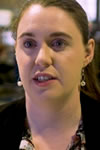Ask me a question!
What were the main 'career decision' milestones in your life so far?
The career decisions I made to be an opera singer came quite late for me, I had already studied a degree in Physical Education and English after leaving school, but it was because I had studied and taken an interest in a wide range of things in school, that I was in a position to change careers (I had taught for four years after leaving the University of Limerick).
A range of subjects, including languauges, Music, Choir, Classics, and having participated in things like debating and school musical and theatrical performances, meant that I had the confidence and background to go into singing at a late stage. Of course, ultimately the decision to go and study singing full time was what facilitated me becoming a professional singer.
Who are the people who most influenced your career direction?
My music teacher in secondary school was the one who heard that I had a good singing voice, and nurtured it. I was more interested in playing hockey and football! It took me several years to realise that a career in singing was something that could be a reality for me, and to put a plan in place to leave my job and go back to university. After completing my studies in singing in Vienna, it was another teacher (this time my language coach in the University there) who recommended to me that I attend an audition for a summer course, I auditioned and was accepted, and it was there that I was offered my apprenticeship at Frankfurt Opera House.
The classical music world is very much one where future work is often offered based on work you're currently doing, so it's always important that you do a good job, you're well-prepared, and are a good colleague. I think these points are useful to remember no matter what job you're in!
How did you go about getting your current job?
There are a couple of ways that singers are hired for work, one is via auditions. Typically at an audition, you are invited to sing for an opera house or casting director, you bring 5 pieces with you, and they provide a pianist (sometimes there is no time allowed to rehearse with the pianist beforehand!) and you sing 2-3 pieces from your list, and based on what they hear, if they like you and have something suitable to cast, then you're in luck!
More often than not though, singers will be cast because a director or conductor has worked with them before and knows they would be suitable, or they'll have seen them on stage or in concert and want to work with them based on that. So it's really important that when you're performing, it's to the best of your ability. You never know who's in the audience!
Describe a typical day?
There isn't really a typical day! If I'm in the middle of a production, this normally lasts for 6 weeks (if it's a new show) and there will be two rehearsal sessions, in a rehearsal room, with piano, for 4 weeks. Then there's what's called a Sitzprobe (German for Seated rehearsal) where the orchestra and the singers meet for the first time, and go through the opera from start to finish (the singers are usually seated, and there's no acting and no costumes).
Then for the final two weeks there are a series of rehearsals for the different departments to get stuff ready for opening night-Stage and Orchestra for the conductor to iron out any musical issues, and some Tech rehearsals where the lighting/costume/set departments can run things and check how they look, and finally Dress rehearsals where everything is run together in anticipation of opening night. There's a lot that goes into making opera run smoothly!
If I'm not in rehearsals for an opera I may be preparing roles or concert programmes, usually it will take up to a year of practicing a big opera role for it to be comfortable to sing, a bit like an athlete preparing for a big race, you need to do a little bit each day for a long time for the muscles in your body to become strong and develop the muscle memory for each piece. Of course you can (and often have to) work on a few different pieces at once, and things almost always overlap, so the skill of learning how to pace yourself is really important. You're very much responsible for your own preparation.
What are the main tasks and responsibilities?
There are a few inter-related tasks, I would say 1.Preparation of your music-this happens at home, on your own, or perhaps occasionally with a coach or teacher. 2. Rehearsal-this usually happens in a period of time directly before the performance, where you meet with colleagues and make decisions together about how best to perform the music. 3-Performance-This is the Lights, camera, action part! All the preparation has been done and all that is left is to get out in front of an audience!
What are the main challenges?
I think for most singers the worry of illness is the most challenging one. Unlike in many other jobs, a headcold or a bit of a sore throat might not prevent you from doing your job adequately, but for us, usually it means taking time off (both to recover and to prevent passing bugs on to colleagues!) as depending on what the ailment is, it can affect your singing, or worse, damage your instrument permanently in more extreme cases.
What do you like most?
I love getting to sing beautiful music! That makes me so happy. And it's an amazing perk of the job to get to dress up as other people and see the world through their eyes. I also love the achievement of working really hard at something that is technically difficult, and then coming together with other people to make something really beautiful that lots of people can enjoy, as well as the storytelling element that we singers get to use very directly, because of having text to communicate to an audience.
What particular skills do you bring to your workplace?
To be a singer you need to : have a good instrument and know how to use it, be able to learn music quickly, be able to follow a conductor, be a good team-player, have a talent for languages and their pronunciation, be a good communicator, be diligent, have a good memory, want to be on stage, be able to take instruction, be able to take criticism, be able to adapt and change things quickly, to name a few!
What subjects did you take in school and how have these influenced your career path?
My advice if you're uncertain about choosing subjects is to choose things you're interested in, rather than what you think will be good for your career. A broad education will serve you really well not only in terms of college options, but also can enrich your life outside of school and work. I have a huge interest in astronomy and loved studying physics in school, and although I'd never have had the talent in Maths to study it at 3rd level or have a career in it, it meant I can really enjoy reading popular science books and keep up with what's going on in space exploration, as a hobby. For Leaving Certificate I studied English, Irish, Maths, Physics, Music, Biology, German and Classical Studies. Looking back, the subjects I did (specifically English, Music, Classics and German) meant that I was well-equipped with a lot of background knowledge that was helpful in my career as a singer, in terms of literature, language and musical training. Without having studied Music at 2nd level, with the wonderful teacher I had, I am 100% certain I wouldn't be a singer today.
What is your education to date?
What aspects of your education have proven most important for your job?
What have been the most rewarding events in your career so far?
Currently I'm an Artistic Partner to Irish National Opera, and also an Artist Creative Associate for the Arts Council in their Creative Schools scheme, so I'm very proud of both of those appointments. I'm also proud that despite starting 10 years after a lot of my peers, that I've trained as a singer and to date have sung across Europe and in cities such as Istanbul and Moscow. I'm looking forward to my NYC debut next year too!
What personal qualities do you have that helps you in your career?
I'm definitely tenacious, this career absolutely requires that! I'd say I'm ambitious too, definitely organised. I wasn't always a natural on stage, it 'was more the music that drew me to being a singer, rather than the performance element, but I've since learned that lots of singers are actually quite introverted and become a stage animal on stage, so we're not all attention-seeking divas! 😊
What is your dream job?
Does your job allow you to have a lifestyle you are happy with?
A very wise colleague of mine put it perfectly being a singer is the best job in the world, it's just not always the best life, and this sums it up for me. It's not for everyone, the time spent preparing things alone, or long periods away from friends and family, and the pressure of having to perform regardless of what's going on in your life can sometimes be very very tough, so what you get out of actually doing the job has to be worth it.
There's no job security, if you get sick and have to cancel, you don't get paid, and no classical musician gets into it for the money! So you have to really want to do this job, but if you do, as my colleague said, it's the best job in the world!
What advice would you give to someone considering this job?
Go for it! It's the sort of job that you'll never know unless you try. If you're starting out, I'd advise making sure you have a really good singing teacher, and then trying to get as much experience as you can. Start with singing in a choir and an opera chorus, so you can see how rehearsals work, and what goes into learning and performing music, then go and audition for conductors and opera companies.
What are the three most important personal characteristics required for the job?
1. A thick skin. Rejection is probably the most difficult part of the job to deal with. 2. Persistence. Be in persistence in practising, persistence in picking yourself up after a failed audition, persistence in general with the career, there are lots of times when people feel they want to give up, so without persistence, forget it! 3. Musical/vocal talent. This is self-explanatory-a good instrument and the ability to use it are.
Have you undertaken, or do you plan to undertake any further training as part of your job?
I don't plan any further formal training, but I have a singing teacher (a bit like a coach for an athlete) with whom I regularly study, it's important to touch base with a pair of trusted ears. As a singer (differently to instrumentalists) we depend a lot on outside feedback, because often we can't discern ourselves how well something is carrying in a concert hall, or what sound is best for a particular phrase, so having an expert you trust is really important!
- Career Development?
- Current Job?
- Education and Training?
- Personal Qualities?
- Advice for Others?














